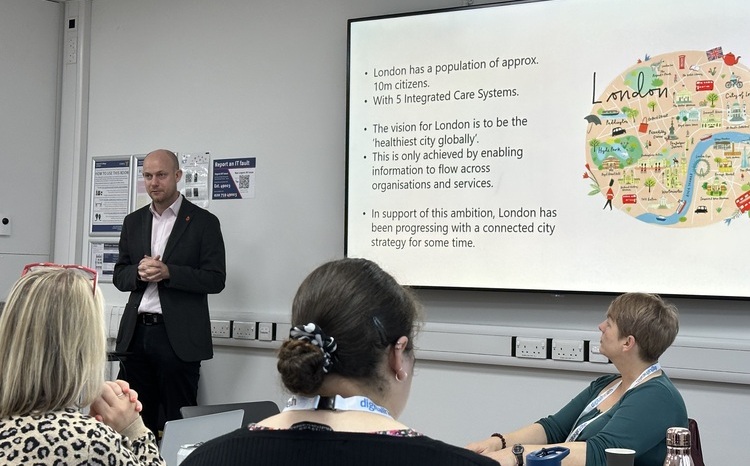Digital Health’s Review of 2018 Part Two: July to December
- 28 December 2018

As Digital Health continues its round up of 2018, we hit the second half of the year. We look back on the balmy summer in which Jeremy Hunt bid farewell to the health brief; charts Matt Hancock’s technology focus; and records the swelling of various exemplar ranks.
As the UK temperatures turned tropical, so too did the heat once more turn up at Number 10… and the consequences were important for healthcare IT. With Boris Johnson resigning as foreign secretary, in protest at Theresa’s May suggested plan for Brexit, Jeremy Hunt found himself in a new job – and handing over the health portfolio he’d held for a record-breaking five plus years.
Enter Matt Hancock, who moved over from the Department of Digital, Culture, Media and Sport to take up the health and social care reins. He quickly demonstrated his fervour for technology, using his first speech in the post to name it as one of his top three priorities. He’d keep up the focus for the rest of the year.
Hancock didn’t quite make it to Summer Schools – we can forgive him; he’d only been in post a few days – but plenty of other key national figures did, sharing views, opinions and insights with 400 gathered health IT leaders from the UK and Ireland.
What was on the mind of most of these individuals, according to Digital Health Intelligence’s Health IT Leadership survey? Interoperability. Perhaps Hancock took note.
The dog days of summer brought potentially worrying news for employees at NHS Digital, with the national body’s announcement of a major restructure. Org2 is intended to create an organisation better suited to current needs; its announcement following a highly critical 2017 review of NHS Digital’s technology and capabilities. But for much of its workforce, Org2 meant confronting potential redundancies.
Staff at NHS organisations across the country, meanwhile, found themselves doing the familiar putting-together-funding-requests-at-short-notice dance, courtesy of the announcement of the Health System Led Investment programme. (You may know it as HSLI, but don’t worry if you don’t – I write about this stuff for a living, and this is one abbreviation that always escapes me.)
As Digital Health News exclusively reported, the initiative involved a set amount of funding being allocated to each sustainability and transformation partnership to advance digital projects. The prospectus made clear only certain plans would be supported, however – if you wanted a different type of EPR to that run by your mate down the street, you were out of luck.
The project prospectus also hinted at further rounds of GDE funding to come. Confirmation came just a few weeks later.
Back to school time and, for MPs, back to Parliament after recess – which meant the month was predictably full of policy announcements. For the third year in a row, the Health and Innovation Expo in Manchester was the launch ground for more global digital exemplars. Matt Hancock announced £200m of funding for the effort, and also took the opportunity to give a stark warning to vendors who refused to cooperate with interoperability standards.
“We will,” he said, “publish robust standards in the coming weeks that IT systems must meet if they’re going to be bought by anyone in the NHS.” For the record, we’re still waiting for them: not to be smug, but that’s something Digital Health editor Jon Hoeksma predicted at the time.
The NHS App also garnered headlines – shouted about at Expo by NHS Digital chief executive Sarah Wilkinson, who heralded the “self-service era”– and was released in private beta.
Another month, another announcement of exemplar-type sites. Take a bow, Wave 2 of the test beds, which the Department of Health and Social Care revealed would be focused on for new healthcare technologies tackling cancer, diabetes and unnecessary hospital visits.
The Department’s minister, meanwhile, released his preliminary tech vision. The main theme: open standards. In an echo of his Expo speech, Matt Hancock pledged mandatory standards, saying that any system which did not meet these requirements would be phased out.
The news got worse for staff at NHS Digital who were fearing for their jobs – a written statement by the secretary of state revealed up to 500 redundancies may take place as part of the reorganisation.
A couple of hundred of miles north of NHS Digital’s Leeds HQ came news of a major new deal. NHS Scotland announced it had signed a “landmark agreement” with Microsoft that would see its entire estate moved onto Windows 10 in the next three years. Microsoft Office 365 software is also be deployed across NHS Scotland, meaning all 161,000 employees across the country’s health and care system will have access to the same platform.
Some of our readers reckoned Linux would have been the better bet.
As the jingle bells, er, jingled, most national attention was focused on the never-ending soap opera that is Brexit. The continuing twists, turns and cliffhangers are such that we experienced a delay in the appearance of the long-awaited NHS 10 Year Plan – the sequel to the well-received blockbuster that was the Five Year Forward View. Initial rumours were an early December release, but that quickly slipped.
For anyone working in healthcare IT, however, the biggest announcement was perhaps not Brexit-related but fax machine-related. The verdict is in, and it’s going to be a hard exit from this technology – removal entirely by 2020.










